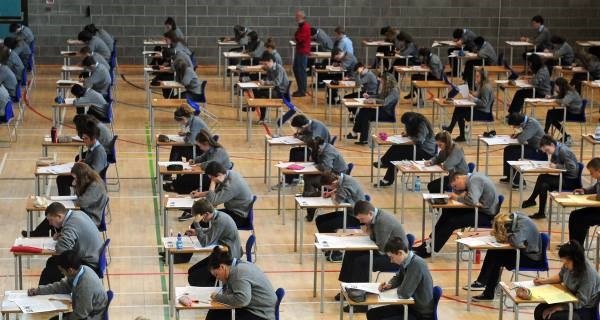
Great expectations

“We had no Internet to help us back then.”
“I studied for nine days straight, without sleeping, and still only got a D.”
“Sure, they practically give them the questions beforehand these days.”
“Exams? We didn’t have exams, we had tests of endurance, I seen lads dying in the hall and everything.”
They were all out last week, all the bores. Reminiscing on their own Leaving Cert experiences, their victories and failures, and how none of it really mattered because they ended up in the job of their dreams after working their way up from the bottom in true underdog style. How inspirational it was to hear their stories, so motivating, at one point I spontaneously began doing push-ups so determined was I to emulate their achievements.
But it did make me reflect on my own Leaving Cert, and how I can hardly remember anything about it at all. I can recall the session afterwards alright, at least some of it, but the actual exams, the build-up and the whole brouhaha which is supposed to surround it, are beyond my recollection. This is partly down to what can best be described as an apathetic attitude to secondary school, a general malaise which set in sometime around the middle of Second Year and didn’t let go until I woke up in the middle of a field, alone and covered in my own sick, on the day of my results.
My inability to recall my Leaving Cert can’t be entirely attributed to this apathy though, and my nascent drinking career wasn’t to blame either. The fact is, it wasn’t as big of a deal back then. Yes, it was obviously a big deal to those of us who were doing it; more so to those who wished to go on to third-level than to the reprobates like me who were just content to pass. But it didn’t feel like the communal event it is now. It didn’t feel like the hopes and dreams of the country were resting on our shoulders, like we had the entire nation in the exam hall with us, poring over our shoulder, discussing the merits of English Paper Two, totting up the points we could gain or lose with one false move; advising us on what courses we should and shouldn’t go for, the college best suited to our needs, where we might live, the psychologist we should see if we’re disappointed with our results, the amount of alcohol we should drink if we’re going out celebrating, the future we could have, the dreams we could realise, the money we could make, the money we’re costing our parents, the goddamn opportunities available to us; how lucky we are, how blessed it is to be young and how everyone wishes they were us and had the chance to do it all over again.

Maybe I’m just more aware of it now, maybe some of my peers went through this while I cocooned myself from the pressure by not trying, but I sincerely doubt it. Everything has been ratcheted up a notch; media coverage has grown exponentially, political discourse on getting the best out of our young students is at an all-time high, and the expectation of acceding to third-level is not just restricted to the upper-classes. Allied to this is the incessant social media coverage, perpetrated not by the students themselves, but by their parents.
I’ve always believed that mammies rule the world, that through sheer will and numbers they can take over anything. This is especially true of Facebook. What started as an innovative social media site designed for college students has gradually morphed into an online space for concerned mothers to discuss their kids – and share videos of silly babies of course. And what Facebook does today, the traditional media does tomorrow. So, if on any given day, Zuckerburg’s juggernaut contains thousands of posts from fretting mothers, worried how lengthy studying sessions are going to negatively impact their offspring, you can bet your ass one of our broadsheets will run an article on that very same topic in the 24 hours later.
It’s an endless cycle, going around and round, the same things discussed over and over again: How some children aren’t receiving the right kind of teaching. How the system is unfairly weighted in favour of such and such a type of child. How everyone deserves to go to college. How girls are better than boys but end up in lower paid jobs. How the rate of drop outs in the first year of college continues to rise. The net result is a, and I hesitate to use the word, mollycoddling of Leaving Cert students. Points for failing exams, lowering of points for college courses, misguided attempts to ensure everyone is included. At some point, there must be a separation, an admittance that not every child is destined for greatness, that some will find their path via a different means, by maybe even failing their Leaving Cert and rejecting our educational system.

Of course, there’s nothing wrong with that; every parent wants the best for their child. But we have reached peak pampering, the pinnacle of a phenomenon which sees more twentysomethings living at home, and for longer, in this country than ever before. At some point we must expose our children to the harsh realities of life, let them fend for themselves, allow them to succeed and fail on their own terms, not psycho-analyse their every move, cosset them until they can hardly breathe. We could start by letting them get on with the Leaving Cert and letting them make their own decisions without involving the entire country.
Bold Justin leading Leo down the garden path

In fact, if you were asked to choose the defining moment of Mr Varadkar’s first few months in charge, it probably wouldn’t even involve politics, at least not directly. Because the undoubted highlight of his introduction to the top office has been his burgeoning friendship with Canadian Prime Minister, Justin Trudeau.
First Leo invited Justin to Ireland so that they could compare socks and go for a jog in the Phoenix Park. And now Trudeau’s returned the favour, providing the milk and cookies for a sleepover in his gaff. And they cut quite the dash when pictured together, bronzed and attractive, young and vital, far removed from the awkward, fusty old farts we’ve grown accustomed to.
But not everyone is so enamoured with this blossoming bromance, some people don’t like it when our new head of state is seen to be enjoying himself, his new bestie in tow. One such person is the eternally cantankerous George Hook. Reacting to An Taoiseach’s trip across the Atlantic, Hook accused him of “swanning around Canada” – stopping short of adding “with that bold boy and his fancy ways.”
But Leo wasn’t taking it lying down, firing back at the surly presenter with a tweet outlining all the important work he was doing in North America. It was all a bit unnecessary, petty, maybe even petulant. Varadkar need only peer across the border to see the corrosive effects of extraneous Twitter usage. He’d do well to find some new friends, ones closer to home, and limit his social media activity to the mundane, generic stuff we expect.








